|
|
|
Catholic Psychotherapy |
Spiritual Counsels |
Books |
About CSF
Introduction |
The Role of a Mother |
Emotional Enmeshment with a Mother |
The Role of a Father |
True Love is Hard Work |
Lack |
Unconscious Consequences of Lack |
Saint Joseph |
The Remedy |
Putting It Into Practice |
Two Natural Models |
Prayer to Saint Joseph |
Modern Prayer to Saint Joseph
 EOPLE who lack a deep understanding of the
Christian Faith will often claim that the Blessed
Virgin Mary is just a goddess substitute taken over from pagan religions.
Yet the Blessed Virgin is far from being a goddess. As
the mother of ou Lord, and therefore the most blessed of all saints, Mary receives
our greatest reverence and respect (called
hyperdulia in technical language). Still,
despite all this reverence from the Church, the Blessed Virgin never was
taken to be comparable to a pagan goddess. Pagan
goddesses kept their sons to themselves, to serve the recurring cycle of
natural fertility. Christianity, however, is something completely different
from a slavery to the closed, repetitious cycle of birth and
death. EOPLE who lack a deep understanding of the
Christian Faith will often claim that the Blessed
Virgin Mary is just a goddess substitute taken over from pagan religions.
Yet the Blessed Virgin is far from being a goddess. As
the mother of ou Lord, and therefore the most blessed of all saints, Mary receives
our greatest reverence and respect (called
hyperdulia in technical language). Still,
despite all this reverence from the Church, the Blessed Virgin never was
taken to be comparable to a pagan goddess. Pagan
goddesses kept their sons to themselves, to serve the recurring cycle of
natural fertility. Christianity, however, is something completely different
from a slavery to the closed, repetitious cycle of birth and
death.
To
save the world from its slavery to death and
sin, God chose to come into the world in human form,
so as to show us exactly how to live holy lives. To do this, He submitted
Himself to the very rules of life that He created. Thus He was born of a
woman, as every human infant must be born. And he provided for Himself a
father, Saint Joseph.
Why a father?
Think about this a bit. The
angel told Mary, “The holy Spirit will come
upon you, and the power of the Most High will overshadow you” (Luke
1:35). Now, if we think of a father in just the biological sense, as a sort
of “sperm donor,” Saint Joseph wasn’t really needed, was he?
God did the work Himself, right?
Well, there’s more to being
a father than just performing a biological function. Despite what contemporary
culture might want to believe about single mothers and homosexual
“parents,” God knows the truth. He should. He created it. And the
Catholic Church knows too. And Saint Joseph exemplifies it all.
The Role of a
Mother
We all need mothers—just
as almost every animal in this world needs a mother. A mother’s role, right
from the child’s conception, is to nurture a child so that the child can
develop strength and inner security through emotional honesty. 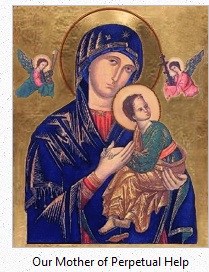 To do this, the
mother must hold the child in her arms, providing comfort and tactile security,
so that the child can experience the bliss of resting peacefully in total
surrender to gentle love. Then, as the child gets older, the mother must provide
the child with hope and encouragement as the child explores and encounters
the world. To do this, the
mother must hold the child in her arms, providing comfort and tactile security,
so that the child can experience the bliss of resting peacefully in total
surrender to gentle love. Then, as the child gets older, the mother must provide
the child with hope and encouragement as the child explores and encounters
the world.
The Blessed Virgin did
this perfectly for the child Jesus. The Bible witnesses to it: “Blessed
is the womb that carried you and the breasts at which you nursed,” we
hear from Luke 11:27.
And look at the icon of Our
Mother of Perpetual Help. At the sight of the Cross, the child Jesus
leaps into His mother’s arms, one sandal dangling from His foot as testimony
to His haste in seeking out His mother’s protection. And notice this
well: a mother’s protection, until the time is ripe for the real
Cross. Jesus didn’t run to His mother to hide from the cross; He ran to
His mother to get comfort to face the cross. Thus a mother must be a solid core
of faith in the family so as to teach her children how to
pray, to prepare them for the journey to their own
crosses.
|
EMOTIONAL ENMESHMENT
WITH A MOTHER
When fathers are weak
and lacking in compassionate command authority, mothers will often step in to take
control of the family. More often than not this control will take the form of
manipulation, using sulking, withdrawal, and anger to make others bend to the
mothers’ will.
Consequently, children
in such families can become enmeshed with their mothers, seeking always to please
the mothers, and always terrified of slipping up and drawing down on themselves the
wrath of a slighted mother. As a result of always trying to do what their mothers
want, such children, when they become adults, will be preoccupied with the thought
of, “What would my mother want me to do?” Thus they will be lacking in a confident
ability to think independently.
Many of these persons can
fall into stifled, dysfunctional lives and suicidal tendencies. Nevertheless, some
of these persons can function fairly well, and they can even give the impression of
being good workers. But when faced with any stressful, trying situation that requires
decisive action, these persons will be unable to assert a clear and confident command
authority to cope with the situation; instead they will tend either to withdraw into
fear or into sulking depression or to get angry and fly into a rage, essentially doing
to others what their mothers did to them.
So, is there a cure for
this? Yes, but as in many things psychological, it can be difficult to go there, because
it means facing the truth. To overcome their enmeshment with their mothers, such
individuals must admit something very true, but very repugnant: “I hate my father and
mother.” Yes, deep in their unconscious they hate their fathers for being weak, and they
hate their mothers for being manipulative and controlling—but in defensive denial they
will insist, “My father is (or was) a good man. And my mother is (or was) a long-suffering
saint.” Still, if only they can admit the truth about their hatred, then they can proceed
along the path of psychotherapeutic healing. On that path they can face the childhood
emotional pain of lacking fatherly guidance and protection and of being controlled and
manipulated by a domineering mother. Once they face the truth of that pain, they can
face—and overcome— the hatred and anger they have long denied but that has
long crippled their lives with indecision, withdrawal, and anger. |
|
The Role of a
Father
As both the Catholic Church and psychoanalysis
have long understood, a father must “come
between” a mother and her child to sever the child’s bond of dependence
on the mother and to lead the child out into the world so that the child
can develop his or her talents and take up a meaningful, productive life
of honesty and integrity. In doing this, though, the father does not
“eliminate” the child’s need for a mother; instead, the father
refines the role of the mother.
|
Most children
experience the delight of being fed and protected when they are helpless
infants. In fact, if they don’t experience it, they die. And the delight
of this early infantile experience, which makes no demands on us and leaves
us free simply to enjoy it, is at the root of our adult yearnings for a
“utopia” in which all of our needs are taken care of
effortlessly.
But to function
responsibly as an adult, a child must pass beyond this care-free infantile
state of dependence. If this task fails, the child will remain neurotically
dependent on maternal protection and will be afflicted with doubts and
anxieties about assuming personal
responsibility in the world. Moreover, the child’s
talents will either remain buried in
fear or will be expressed largely through an unconscious
grandiosity. And, in its most severe manifestations, alcoholism and drug
addictions can develop in adolescence and adulthood, because all
addictions have their roots in a desire to escape
the demands of personal responsibilities and return to an idyllic feeling
of care-free bliss. |
|
A child, therefore, has three
essential tasks which must be accomplished under the guidance of a
father.
1. To learn
how the world works.
The father must teach the child
not only about the abstract—and often dangerous—dynamics of social
relationships beyond the family itself but must also provide instruction
in the practical rules governing the physical world, including honest, productive
work in the world.
|
Imagine a primitive
society of forest dwellers. To teach the child how the world “works,”
the father must take the child out into the depths of the forest and show
the child how to survive and eat by using weapons, building fires, and making
shelters. Now, the modern world may not be a forest anymore—though it
is often enough called a jungle—yet the forest metaphor aptly describes
the process by which a father must teach a child “how the world
works.” |
|
2. To learn
to trust.
Yes, a child will more-or-less
“trust” a nurturing mother. This sort of trust, though, is a necessary
part of mother-infant bonding for the sake of the infant’s physical
survival.
Real trust requires that the
child grow to depend on and respect the father, a person different from the
mother from whom the child originated; that is, the father is a different
body and a different gender from the mother. The father—and
only a father—can therefore teach the child to enter the world and encounter
difference confidently.
But, to be a successful teacher,
the father must teach this from the place of his own
faith and obedience. In other
words, the father must live from his heart the very same rules he teaches
to his children. He must touch their souls with his soul.
• |
He must touch his
children with physical affection; |
|
• |
He must touch his
children with sincere affirmations of their talents; |
|
• |
He must touch his
children with protection from evil influences and
bad decisions. |
|
In this way the children can
learn to trust him through his own integrity. Otherwise, the children will
see him for a hypocrite and will
disavow—openly or secretly—everything he represents.
3. To learn
to trust oneself.
As a child receives instruction
from a trustworthy father and develops a sense of confidence under the
father’s compassionate guidance, the child
will then be able to function more and more independently, assimilating the
father’s external guidance into an internal, psychological
confidence.
|
First the father
builds a fire, saying to the child, “Watch me.” Then the father
encourages the child to build the fire. Finally the child goes off into the
forest alone, and builds a fire on his own, confident in what he learned
from his father. |
|
True Love is
Hard Work
Living a genuine Christian life
is hard work. It requires discipline. It’s tedious. It’s often
frightening. It requires constant effort to monitor
our feelings and the
impulses that arise with our feelings, and to
override those impulses—those signs of what we want
personally—with a firm decision to live a holy
lifestyle by doing God’s will.
Therefore, learning to live a
Christian life requires parents—especially a father—who can teach
the child both through words and actions that they are willing to do the
hard work themselves.
It’s all far easier to serve
the devil by doing whatever we want. Do what thou
wilt. That’s the motto of Satanism.
Lack
Now, considering all of this
about the role of a father, look about you and see how many fathers shirk
the hard work of being a father and fail miserably in their responsibilities.
How many fathers are absent from the family because they were nothing more
than “sperm donors” in a moment of lust? How many fathers are absent
from the family because of divorce? How many fathers are absent from the
family because their adultery draws them away to another woman? How many
fathers are absent from the family because they are emotionally insensitive
to their children’s needs? How many fathers are absent from the family
because they are preoccupied with work or sports? How many fathers are absent
from the family because they are preoccupied with their own pride and arrogance?
How many fathers are absent from the family because of alcoholism? How many
fathers are absent from the family because of illness? How many fathers are
absent from the family because a woman decided she didn’t need a man
to have a child? It can go on and on. And it does.
|
Consider communities
in which single mothers are the norm, rather than the exception. What do
you see there? A male disrespect for women, low educational performance,
social disobedience, violence, drug abuse, prostitution, and a general lack
of social opportunity. |
|
And the sad thing is that when
a father is absent—whether physically or emotionally—his lack causes
a personal lack in the children. Lacking understanding of how the world works,
lacking trust in others, and lacking trust in themselves, children—whether
they be boys or girls—become lost, insecure, and confused. They lack
confidence. They lack real faith. They lack a spiritually meaningful future.
They lack life. All because their fathers were
lacking.
Unconscious
Consequences
Please note, though, that all
of this lack resulting from the lack of a father is, in many cases,
largely
unconscious.
Yes, some persons are truly
crippled—both emotionally and socially—by the lack of a father,
and their lives become dysfunctional and stuck.
And, sadly, some die in childhood from abuse at the hands of the mother’s
“partner.” [1]
But other persons are able to
keep up a surface appearance of functionality; they hold jobs, they get married,
and they have children. And they may even be active in their churches. Yet
under the surface of normality—and often under the surface of devotions
and novenas—a deep secret of anger and
victimization
is buried.
In the unconscious, however,
the anger gets distorted because it is difficult for children to admit being
angry with a father from whom they still desire
a sign of love. To protect themselves from the threat of their own anger,
then, the children distort that anger by turning it against themselves to
ensure that they do nothing.
• |
Addictions (such as alcoholism, drug addiction, obesity, smoking,
marijuana use, video games, casinos, etc.) allow them to feel filled when
they are really empty; thus they feel
nothing.
|
If a father fails
in his role as a proper father, then he will also fail in his duty to separate
the child from its infantile dependence on the mother. In sadness and anger
at this loss, the child can then unconsciously “return” to the
mother in psycho-social development, thus setting up the dynamic of an
addiction.
Addictions to
a substance (e.g., alcohol, drugs, food) can therefore serve the unconscious
purpose of numbing the pain of the loss of the father’s guidance and
protection.
Autoerotic sexual
“addictions” can differ in men and women. In men, they can signify the
boy or man “handing” his father’s failure to his mother. In
women, they can signify the girl or woman “handing” her sexual
pleasure to her father in an unconscious attempt to entice him back to
her.
Interpersonal
sexual “addictions” can also differ in men and women. In men, they can
signify the man’s desire to gratify his depressed or unhappy mother.
In women, they can signify the woman’s desire to regain her father’s
lost attention.
|
|
|
• |
Argumentativeness prevents them from accepting truth, which includes
the truth that the father has failed them; thus they accept
nothing. |
• |
Being
late for appointments and meetings
prevents them from having to wait; thus they wait for
nothing. |
• |
Immodesty (whether as revealing clothing, gaudy make-up, tattoos,
piercings, etc.) prevents them from respecting their own bodies; thus they
respect nothing. |
• |
Learning
disorders prevent them from discovering
a world that seems hidden from them; thus they discover
nothing. |
• |
Mental
confusion (often expressed by forgetting
things or as difficulty with math) prevents them from engaging with the signs
and symbols of life; thus they engage with nothing. |
• |
Procrastination prevents them from stepping out into the world they
don’t know how to negotiate in the first place; thus they accomplish
nothing. |
• |
Sexual
preoccupation (whether as self-created
mental fantasies, pornography, lust, or sexual acts) prevents them from
experiencing emotional intimacy; thus they are intimate with
nothing. |
• |
Suspiciousness prevents them from having to trust a world they fear;
thus they trust nothing. |
In the end, all these
nothings, taken together, lead to the nothingness of death: symbolic
death, which keeps a child emotionally disabled as punishment for his
or her anger, and real death—through slow self-sabotage or through
outright suicide—by which the child, in making herself or himself the
“missing one,” draws attention away from the truth that the father
has been missing from the child’s life all along.
|
There is no current
psychiatric diagnosis for this collection of symptoms, so I have named
a psychoanalytic diagnosis: Ira Patrem
Latebrosa (hidden anger at the father). This is an anger at the
father that so cloaks itself in invisibility that a person afflicted with
it will deny that it even exists. Yet it does exist, and the evidence above
proves it, like tracks in the snow that reveal the presence of an animal
lurking nearby. |
|
Now, the irony here is that although
all of these self-defeating behaviors are based in anger at the father and
are unconsciously motivated to “get back at” the father, they can
ultimately lead a person into religious
disobedience and willful
sin. Why? Because in the unconscious our separation
from God the Father (resulting from our Original Sin)
becomes confused with the lack of an actual father. Anger at God, though,
gets us nowhere—at least, nowhere pleasant. And so unconscious anger
ultimately hurts only ourselves.
Without intense
scrutiny, the dark roots of these self-defeating
behaviors remain outside of conscious awareness. Yet when individuals examine
their private inner lives in psychotherapy or spiritual
direction, and the deep truth of their hidden despair emerges, they end
up admitting that they have been secretly hating themselves all along and
that their lives have failed to bear much—if
any—spiritual fruit.
Saint
Joseph
In contrast to all the lack in
many families, Saint Joseph exemplifies a father’s presence as
a teacher, a trustworthy man of faith, and a man whose faith inspires others
to grow in confidence and wisdom.
Saint Joseph was a carpenter
who taught Jesus the craft; thus, he taught Jesus how to work
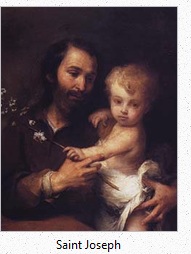 in the world. And
we know that Jesus learned from him, because Jesus was obedient to him
(Luke 2:51). in the world. And
we know that Jesus learned from him, because Jesus was obedient to him
(Luke 2:51).
We also know that Saint Joseph
was a righteous man (Matthew 1:19). He was also a man of faith because when
an angel gave him instructions in a dream, Saint Joseph obeyed without
question—twice (Matthew 2:13-15; Matthew 2:19-23).
Finally, we know that Jesus grew
in self-confidence under Saint Joseph’s guidance: the child grew
and became strong, filled with wisdom (Luke 2:40; see also Luke 2:52).
Thus Saint Joseph’s role as father was to prepare Jesus to serve His
heavenly Father. And this is all foreshadowed by the story of The Boy
Jesus in the Temple (Luke 2:41-52), when, at the age of maturity, Jesus
declares to Mary, “Did you not know that I must be in my Father’s
house?” This event represents the symbolic separation of the child from
the mother by the father. Thus, to achieve this separation, Saint Joseph
served as father until Jesus was prepared Himself to serve the
Father.
The
Remedy
So what can you do if your own
father’s lack has left you lacking? What can you do if, despite your
best attempts on your own, you still feel doubtful, insecure,
fearful, and interiorly embarrassed for not living
a holy life?
Well, regardless of the lack
of your own father, you can be led through Christ to the utter fullness of
life in God the Father. To do this, though, you must set aside your unconscious
anger at your father and take full personal
responsibility to remedy what is lacking in
you.
|
“But
wait,” you say, “I have no issues with my father. We got along
well together. My mother was the cruel one.” In that case, don’t
be deceived by sentimentality. Yes, you have to resolve a lot of anger at
your mother—yet, in addition to that, you will find considerable unconscious
anger at your father: for being too physically ill, too mentally ill, or
just too weak or cowardly to stop your mother’s abuse. |
|
Therefore, acknowledge what was “stolen”
from you as a child; feel the pain of that loss and bring it all to Christ; acknowledge
that your father’s behavior was wrong and yet put justice in God’s hands so as to give
up hate for your father; and then turn to Christ in
full confidence to lead you to the resources you need to teach you what you never learned
as a child.
Putting It Into
Practice
Pay attention to times when you
get stuck, when you feel blocked, when you lose confidence, when you get
impatient, when you doubt yourself, etc. At those times, tell yourself something
like the following:
|
Overcoming the Pain of
a Missing Father
“OK. I’m feeling
[stuck, unable to concentrate, indecisive, whatever]. This
is happening because of what my father failed to do for me. He failed to
[love me, provide guidance, give encouragement, teach me confidence,
whatever].
“But now I know that my
difficulties are resulting from his failures. In the past, I would have blamed
myself. I would have said that I was bad or that I was defective. Now that
I know that I am feeling this way because of what my father failed to do
for me, I no longer have to blame myself. I have skills, I have
talents—they just never got developed properly
under my father’s guidance.
“So now that I know that
I’m not at fault, I will go about learning how to develop my skills
and talents. I will take personal responsibility for myself.
“Moreover, I’m not
alone. I have God to help me. God loves me and cares for me. Together—God
and myself—we can change my life and provide for me what my father never
did.
“In all of this, I won’t
blame my father because blaming him is like hating
him, and blame only keeps me in the place of a
victim. Blame makes me angry, and
anger at him makes me feel guilty, and guilt cripples
me. I will be honest with myself about what my father failed to do, and
that’s not blaming him—it’s just about getting to the truth.
The truth will set me free, and so I will be free to join with God to fulfill
my talents.”
Then say, |
|
“ |
This would
be easier now if I had a father who had
been able to guide and protect me when I was a child,
but I didn’t have such a father;
so I accept this task gracefully, without demanding
that God make it easier,
and I trust in God’s guidance and protection to help me
accomplish it.” |
|
None of this
is easy. It doesn’t happen just by thinking about it. It requires mental
and physical discipline. It takes hard work. It takes courage. And, if your
father was lacking, then you lack courage, don’t you? Therefore, the
only way to learn to trust in God is to strip away everything we use to hide
from Him so that, left with nothing of our own making—with no arrogance,
no pride, no hatred, and no bitterness for what others have done to us—we
have no choice but to acknowledge our wounds, feel the pain,
bring it all to Christ, and depend on Him
alone. |
|
Two Natural
Models
In all of this, keep in mind
two natural models. Mary, the Blessed Virgin, in all of her titles, represents
the Church, the mother who nurtures our souls with her Sacraments during
our life-long journey to our true Father. Saint Joseph represents all priests
of the Church, not in their priestly role per se (that is, as
representatives of Christ) but as symbolic fathers who lead us beyond themselves
to serve our true Father.
And what about Christ? Well,
Christ has no natural model. In some ways, yes, we are all like Him as a
child, who grew in wisdom through obedience to His parents. So we must grow
in holiness through obedience. But, in His ability
to heal our
brokenness through the broken bread
of the Eucharist—His body and blood, faith and
love—He has no natural parallel. No other religion
has a God like this, who came into this world in human form to save us from
our sin, who loved us despite our lack of love, who
endured all of our hatred without hating us, and who offers us His unfathomable
mercy if only we would turn away from what we
think we are and turn back to what He really is—and what
we can be in Him: God’s children with a real Father.
|
Christ is in
the Father by reason of His divine nature, we are in Him by reason of His
human birth, and He is in us through the mystery of the
sacraments. |
|
|
—from a treatise
by Saint Hilary, bishop
Office of Readings, Wednesday
of the Fourth Week of Easter |
|
Traditional Prayer
to Saint Joseph
In 1889, in
Quamquam
pluries, Pope Leo XIII prescribed that this prayer to St. Joseph
be added to the recitation of the Rosary during the month of October. Nothing
prevents this prayer from being used by the faithful at any other time.
TO thee, O blessed
Joseph, do we have recourse in our tribulation, and having implored the help
of thy thrice-holy Spouse, we confidently invoke thy patronage also. By that
charity wherewith thou wast united to the immaculate Virgin Mother of God,
and by that fatherly affection with which thou didst embrace the Child Jesus,
we beseech thee and we humbly pray, that thou wouldst look graciously upon
the inheritance which Jesus Christ hath purchased by His Blood, and assist
us in our needs by thy power and strength.
Most watchful Guardian of the Holy Family, protect the chosen people of Jesus
Christ; keep far from us, most loving father, all blight of error and corruption;
mercifully assist us from heaven, most mighty defender, in this our conflict
with the powers of darkness; and, even as of old thou didst rescue the Child
Jesus from the supreme peril of His life, so now defend God’s Holy Church
from the snares of the enemy and from all adversity; keep us one and all
under thy continual protection, that we may be supported by thine example
and thine assistance, may be enabled to lead a holy life, die a happy death,
and come at last to the possession of everlasting blessedness in heaven.
Amen.
Modern Prayer
to Saint Joseph
I wrote this prayer myself.

Ordering information

Notes.
1.
Schnitzer PG, Ewigman BG. Child deaths resulting from inflicted injuries:
household risk factors and perpetrator characteristics. Pediatrics.
2005 Nov;116(5):e687-93.
|
“Young children
who reside in households with unrelated adults are at exceptionally high
risk for inflicted-injury death. Most perpetrators are male, and most are
residents of the decedent child’s household at the time of
injury.” |
|
Recommended
Reading
 |
 |
Abandoned in childhood by
his father, a man sought his revenge by laying plans to destroy the Catholic
Church from within. He became a priest influential in Vatican II and
beyond—but then something happened that he didn’t plan. The God
in whom he did not believe caused him to write his memoirs and then brought
about his unexpected death in a traffic accident. Subsequently, the memoirs
were brought to light and published. Moreover, in His great mercy, God gave
the man a short time in a coma to contemplate his sins before he actually
died. We don’t know the ultimate disposition of his soul, but we do
know the reason for the unexpected disruption to his plans: the mystical
sacrifice of a young woman known to the man as “Raven Hair.” Her
sacrifice? She set aside her romantic hopes and became a Carmelite nun to
pray for his soul and for the good of the whole Church.
TAN Books and
Publishers
|
|
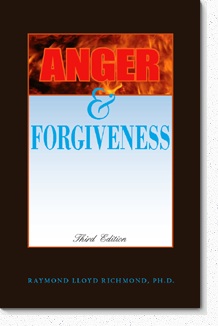 |
 |
Anger and Forgiveness by Raymond Lloyd Richmond, Ph.D. explains how most
of us carry more anger in our hearts than we are capable of admitting even
to ourselves. As a result, we often feel stuck in lives of unfulfilled potential,
unending resentments, and physical illness. In this book, Dr. Richmond explains
the deep psychological implications of anger and forgiveness and shows how
to turn the emotional wounds of daily life into psychological
growth.
Ordering Information |
|
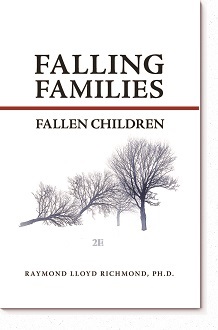 |
 |
Falling Families, Fallen Children by Raymond Lloyd Richmond, Ph.D. Do
our children see a mother and a father both living in contemplative love for
God with a constant awareness of His presence and engaged in an all-out battle
with the evil of the world? More often than not our children don’t see living
faith. They don’t see protection from evil. They don’t see genuine, fruitful
devotion. They don’t see genuine love for God. And so, with seething unconscious
anger at their parents, especially at their fathers, they become fallen
children.
Ordering Information |
|
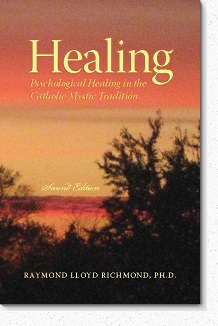 |
 |
Healing by Raymond Lloyd Richmond, Ph.D. explains how psychological
defenses help to protect us from emotional injury. But if you cling to the
defense mechanisms that were created in your childhood and carry them on
into adulthood—as most everyone does unconsciously—your quest for spiritual
healing will be thwarted by overwhelming resentments and conflicts.
Still, God has been trying to show you that there is more to life than resentment and
conflict, something so beautiful and desirable that only one thing can resist its pull:
hate.
So now, and in every moment until you die, you will have a profound choice between your
enslavement to old defenses and the beauty of God. That decision has to come from you.
You will go where you desire.
Ordering Information |
|
|




 To do this, the
mother must hold the child in her arms, providing comfort and tactile security,
so that the child can experience the bliss of resting peacefully in total
surrender to gentle love. Then, as the child gets older, the mother must provide
the child with hope and encouragement as the child explores and encounters
the world.
To do this, the
mother must hold the child in her arms, providing comfort and tactile security,
so that the child can experience the bliss of resting peacefully in total
surrender to gentle love. Then, as the child gets older, the mother must provide
the child with hope and encouragement as the child explores and encounters
the world.
 in the world. And
we know that Jesus learned from him, because Jesus was obedient to him
(Luke 2:51).
in the world. And
we know that Jesus learned from him, because Jesus was obedient to him
(Luke 2:51).




